Khojaly Massacre In Azerbaijan: Commemorating 24th Anniversary
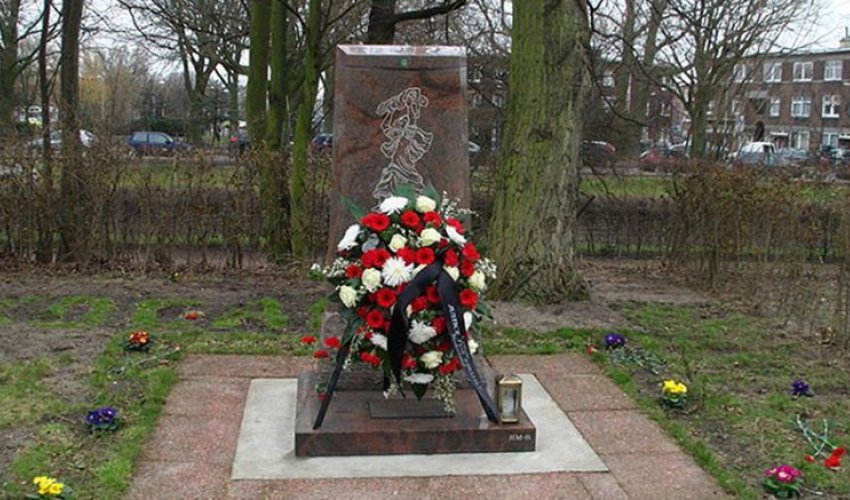
By Peter Tase
As we take a look back in history, one of the greatest tragedies in the latest century is the Khojaly Massacre orchestrated by the Armenian Army that killed at least 613 ethnic Azerbaijani civilians from the town of Khojaly on February 25-26, 1992, during the War of Nagorno-Karabakh: 63 of them were children, 106 of them were women and 70 were old people. Eight families were completely destroyed, 25 children lost both of their parents, 130 children lost only one of their parents, 657 men became disabled, and 1275 were captivated and the fate of 150 captivated men is still unknown.
For Mr. Tale Hasanov, Editor in Chief of the European-Azerbaijan Information Center: "the current history has witnessed many bloody events. But to live horrors of Khojaly tragedy where women, old men and children were savagely killed and to bear this, is out of the human will. Only we, Azerbaijanis could live that tragedy. Because we are the nation who witnessed many tragedies throughout history…”
Such a conflict has become one of the longest conflicts in modern history and has been protracted for over two decades due to repeated military exercises, constant provocation maneuvers undertaken by the Armenian Army in the sovereign territory of Azerbaijan, including its region of Nagorno-Karabakh and its surrounding territories that are occupied by Armenia; and propaganda warfare that Armenian government has led against Baku and its democratically elected government of President Ilham Aliyev.
Armenian military provocations have been more frequent in the border areas with Azerbaijan, and even worst the bloody shadows of the Khojaly Massacre hunt until today the Azerbaijani civilians, farmers who live in their ancestral land, nearby Nagorno-Karabakh, where they continue to be attacked and killed by Armenian reconnaissance forces who intentionally violate the ceasefire agreement with Azerbaijan. According to the Azerbaijani Defense Ministry Officials in Baku, only on January 30th, 2016, the Armenian Armed Forces have broken the ceasefire over 128 times, attacked the defense positions of Azerbaijan Armed Forces in the line of contact.
These sporadic, but consistent shootings, have taken place on numerous positions on a border that is almost 100 miles long. Additionally, on November 22, 2015, the Armenian Armed Forces opened fire against the following neighboring villages: Gulustan of Goranboy district; Chilyaburt, Gizil Oba of Terter district; Shikhlar, Shuraabad, Bash Gervend, Kengerli, Yusifjanli, Merzili, Javakhirli, Garagashli of Aghdam district; Kuropatkino of Khojavend district; Horadiz, Garakhanbeyli, Gorgan, Ashagi Veyselli, Ashagi Seyidahmadli of Fizuli district and Mehdili of Jabrayil district. The positions of Azerbaijani Army were also hit by the Armenian heavy weapons located in the districts of Goranboy, Fizuli and Khojavend.
In front of all these armed provocations, Azerbaijani military forces were obliged to respond by fire until the Armenian provocateurs would refrain from shooting. Moreover, Armenia has implemented a decade’s long blockade to the Autonomous Republic of Nakhchivan, thereby causing economic hardships to this dynamic region of Azerbaijan. In front of such a belligerent attitude that continues to erupt out of Yerevan, the International Community has taken a passive role towards solving this armed conflict and to impose sanctions against Armenia for occupying the territory of one of its neighbors, Azerbaijan.
In relation to the Khojaly Massacre, Thomas Patrick Lowndes de Waal, a British journalist who is best known for his book "Black Garden: Armenia and Azerbaijan Through Peace and War”: the president of Armenia Serzh Sargsyan appears to be proud and is unwilling to regret and publicly apologize for the mass slaughtering conducted by his fellow countrymen against civilians of a neighboring peaceful nation such as Azerbaijan.
An Armenian dashnak and author Zori Balayan in his book "Revival of our souls” recalls the experiences of a ruthless Armenian hit man: "….With the requirement of dignity of citizenship and the duty of a holy man I participated in the massacres of Khojaly…When I and Khachatur entered the house, our soldiers had nailed a 13-year-old Azerbaijani child to the wall. In order for him not to make much noise, Armenian soldiers put his dead mother’s cut breast into his mouth. Then I scalped-cut the head of a Turkish child and skinned his chest and belly. Seven minutes later, the child died due to bleeding …. . Then Khachatur cut his body into pieces by axe and threw them to dogs. We did the same to three other Turkish children in the evening. I did my duty as an Armenian patriot.”
What kind of bilateral negotiations do we expect from the "political elite” that rules Armenia today? Which is the same government that defends and protects these monstrous acts of criminals who have committed the most horrific crimes against humanity and have barbarously killed hundreds of Azerbaijani civilians by using horrendous massacres; that even Adolf Hitler’s SS officers had not committed, against the civilian Jewish population of Germany during World War II.
Another Armenian dashnak Davud Kheyriyan in his book entitled "In the name of Jesus” published in Beirut wrote: "This cold morning we had to make more than 1 km distance in the direction of Dashbulag where there were piles of dead bodies all around. I did not want to walk on dead bodies. At that time lieutenant-colonel Ohanyan pointed to me that there is no reason to be afraid. These are the rules of war. …. I put my foot on a bloody chest of a 9 to 11 years old girl and began to walk. My shoes and trousers were full of blood.”
According to APA, there are many facts attesting the involvement in the Khojaly Massacre of Zori Balayan – one of ideologists of "Greater Armenia”. Zori Balayan is searched by Interpol and admits and proudly praises the Armenian genocide against Azerbaijanis in Khojaly in his book "Revival of our souls” published in 1996: "I did my duty as an Armenian patriot. Khachatur had sweated much. But I saw struggle of revenge and great humanism in his and other soldiers’ eyes. The next day, we went to the church and prayed to clear our souls from what had happened in the previous day. But we were able to clear Khojaly from slops [stains] of 30 thousand people”, the book reads. Zori Balayan said every Armenian should be proud of this action. The above mentioned crimes of Armenians against the Azerbaijani civilians and children are described on pages 260-262 of the book "Revival of our souls” published in 1996.
The protracted bloody war, which begun in the late 1980s due to Armenia’s territorial claims against its Southern Caucasus neighbor, left thousands of Azerbaijani civilians of Nagorno-Karabakh and the neighboring regions as internally displaced persons who are accommodated in more than 1600 refugee camps across 62 cities and regions of Azerbaijan. The Azerbaijani civilians in other regions bordering with Armenia and Nagorno-Karabakh have the same fate of being expelled and relocated in Azerbaijan while living in very difficult conditions, refugee camps, tents and wagons.
As a result of the military aggression of Armenia, over 20,000 Azerbaijanis were killed, almost 100,000 were injured, and 50,000 were disabled. The UN Security Council has passed four resolutions demanding the urgent Armenian withdrawal from the Azerbaijani territory, but unfortunately they have not been enforced to this day.
On February, 2016, the international community will commemorate the 24th anniversary of the Khojaly Massacre, however it is unfortunate that Yerevan’s leadership continues to flex its muscles as well as its belligerent foreign and defense policies continue to be the same as in the late 1980s. To set the record straight, Armenian president refuses to accept and regret these massive atrocities committed in Khojaly against the innocent civilians of the Republic of Azerbaijan. To conclude there is no other expression that describes the Armenian attitude better than what George Santayana, a XX century American philosopher, said in his first volume of "The Life of Reason”: "those who cannot learn from history are doomed to repeat it.”
(Eurasiareview)
www.ann.az
Similar news
Similar news
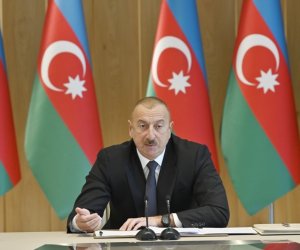
Political News
18:48
Azerbaijani President: By burning our flag, Armenians only showed their ugly qualities to the whole world
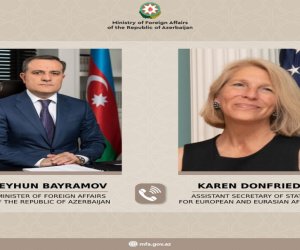
Political News
10:30
Azerbaijani FM, US Assistant Secretary of State discuss peace process between Azerbaijan and Armenia

























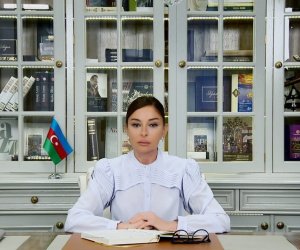
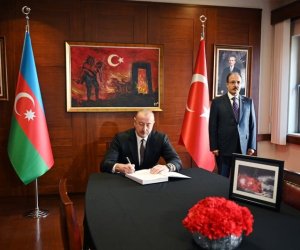
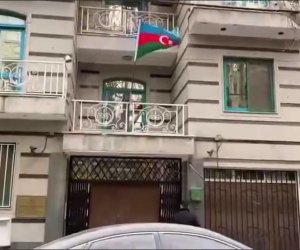
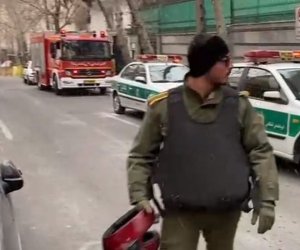
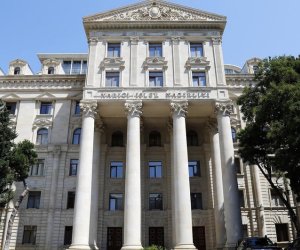
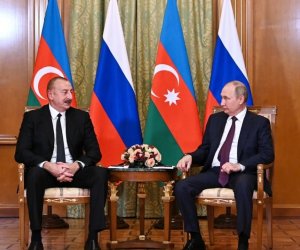



 Photo
Photo 



 Video
Video 

